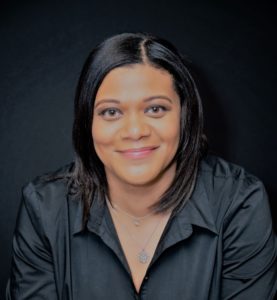Marinda Logan – Alumna Spotlight

Health Scientist, Office of Laboratory Science (OLSci)
Office of Laboratory Science and Safety (OLSS)
Centers for Disease Control & Prevention
Hometown: Oxford, MS
BS in Biological Science (1998)
LinkedIn
When and why did you decide to major in biology?
At Lafayette High School (Oxford, MS) I took the standard biology curriculum courses and one AP course. I was fascinated by the study of living organisms, how to conduct research experiments, dissecting frogs and worms and knew I wanted to major in Biology in college. Before I started my freshman year at Ole Miss, I participated in the Louis Stokes Mississippi Alliance for Minority Participation/Increasing Minority Access to Graduation (IMAGE) Program (formerly the Mississippi Alliance for Minority Participation). This was a summer program to increase participation and graduation of people of color in STEM-related fields. My participation in this program (e.g., taking college courses, field trips, hearing visiting lecturers/speakers, and having students/mentors in the various science or allied health-related majors) helped shape my interest in becoming a Physical Therapist.
What were some significant accomplishments/favorite memories at UM?
My favorite memories include my participation in the LSMAMP/IMAGE Program, serving as an orientation leader my sophomore year, and becoming a member of the Theta Psi Chapter of Alpha Kappa Alpha Sorority, Incorporated. I wanted to join a sorority because of sisterhood and service, and this was exemplified in the women of AKA. I met like-minded young women who were goal oriented, and I learned how to organize and execute programs to serve the community. I keep in touch with many former chapter members, and we reminisce about our college days. Finding the balance of education and extracurricular activities is very important. Education was my focus, and it was enhanced by my participation in other organizations. I would say I became a well-rounded individual who learned a lot from my different experiences.
Please tell us about your educational/career path since UM.
I decided to pursue a career in Public Health after having a conversation with Dr. Alfred (AI) Mikell who was a microbiology professor at that time. He encouraged me to attend the University of Alabama at Birmingham’s School of Public Health opening. I had never heard of Public Health, but Dr. Mikell thought I would benefit from attending. I attended the opening and was fascinated by the discipline and what I could do to help others. At that moment, I knew my focus would change. I wanted to major in Public Health with my focus in Health Education. I wanted to become a Health Educator to promote health ultimately affecting behavior change. I thought at that time I wanted to stay in Mississippi, and I would eventually further my education, so I applied for jobs in the state.
After graduating from Ole Miss, I was employed by the National Center for Natural Products Research as an Associate Research and Development Biologist. I worked in this position for two years. I knew I wanted to work for the Federal Government and my original plan was to move to the District of Columbia. Again, my plans changed. During this time, I discovered the Centers for Disease Control and Prevention (Atlanta, GA). I applied for an entry-level Health Scientist position and four months later, I received a phone call offering me the job. In this position, I provided technical and scientific support to Senior Health Scientists and Medical Officers in support of the Clinical Laboratory Improvement Amendments 1988. After five years, I decided to continue my education to advance my career in public health. I applied to Emory University’s Rollins School of Public Health. I was accepted into the Behavioral Science and Health Education Program where I majored in public health with a focus on Health Education.
I am currently a Health Scientist (evaluation focus) in the Office of Laboratory Science and Safety (OLSS). The mission of OLSS is to strengthen the culture of laboratory science and safety through leadership, collaboration, and continual quality improvement. OLSS reaches over 1700 scientists and 200 laboratories across the United States and Puerto Rico. I am in the Office of Laboratory Science and this Office is responsible for providing the laboratory community with the policies, tools, guidance, and training to enhance excellence in science, and to support regulatory compliance. I am a member of the Laboratory Training Activity (LTA) team. My role as a Health Scientist is to evaluate whether the LTA’s programmatic and training activities are meeting the needs of the CDC laboratory workforce.
Why should they decide to study biology in today’s world?
When someone majors in Biology, they typically do so because they plan to attend medical or dental school, or further their education in a health or allied science field. Biology is a great foundation for so many careers and my advice is exposure, exposure, exposure. If someone is unsure about what they want to do and are certain they are not going to medical school, do the research. The Federal Government is a great career for those who are interested in becoming a public or civil servant, and it is also a great opportunity to give back. You are making an impact and it affects the American people. There are fifteen Federal executive agencies and so many opportunities. If you want to work at the state or local government level, there are opportunities there as well. Your mindset at 18 may change by the time you are 25. Do not confine yourself to what you think you want to do because life happens, and plans change.
